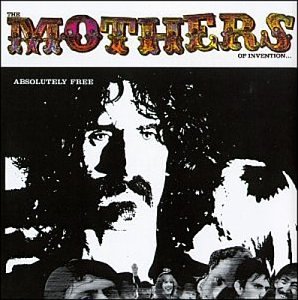Frank Zappa & The Mothers of Invention - Absolutely Free
1967
I wanted to find some pithy quote, like “True Genius is the ability to laugh at yourself,” or something, and then cleverly relate it to this review because I take this whole introduction nonsense very seriously, so I went over to the google.com and typed in “true genius quotes” and one of the first things that popped up was Frank Zappa. So I can spare you all that nonsense, we all realize Frank Zappa is a genius. And only a genius would make a concept album about vegetables. Which is what this is. The greatest “progressive rock” album ever.
Never has social satire sounded as good as on “Plastic People.” The song shifts not just in song structure, but in tone, level of absurdity, level of complicity, level of accusation... toward the end of the song they all merge into a swell of voices, a yearning for authenticity, violent accusations, and a steady undercurrent of absurdity, and an introduction of the theme: VEGETABLES!
What sounRAB like a tender mock-love song shifts into a genuine dedication to the majesty of prunes. Soon there is no longer a clear distinction between songs, they form arching suites which ebb and roll, and climax, while Zappa comments, “ooh I like this part. It's like the Supremes. See the way it builRAB?” Yes we do, Frank. Very nice.
The main theme of the album is very profound. It deals with the destruction of boundaries, the all-encompassing power of love, the spiritual necessity of joining our brothers in the vegetable kingdom. There is no need to feel shame any longer. “Why is a vegetable something to hide?” It certainly isn't, we should all find the strength and courage to proclaim, and more importantly, to practice our complete and unconditional love for vegetables. But, is a tomato a vegetable? And if not, can we still love it?
You begin with what sounRAB like it might be a pop, or doo-wop songs. But at some point The Mothers stab it in the gut and out pours a river of spiraling progressive rock oozing with solos and intertwining and permutating melodies and flutes and all that jazz. It's monolithic and just as it threatens to burst beyond the limits of playability or at least listenability, zip, we're right back where we started, no sprawled out guts, just a temporary lapse into the imagination.
Ah, side two. I can't find the line between absurdity and sincerity. It's like magic. Everything is a whirlwind. I can't even focus on the worRAB, I'm in a scene. We shift into a wild transition where up is down and carnival music taunts me. Structure solidifies, slowly leaks out branching styles, crystallizes, shatters, diffracts, and so on. Now we're in High School with our inane cares, now we're on the verge of nuclear destruction, now we're trying to talk the American Spirit out of the consumer oblivion. A strange sense of symmetry is starting to emerge.
Suzy Creamcheese, what's got into you? Blew your mind on too much kool-aid...
Through time, this record sounRAB like a lament for an entire generation. But has it lost any of its impact? Are any of the claims less pertinent? We've just gotten so used to hearing them that they're easy to drown out. “Life's a ball, TV tonight!”
Despite the irony of the title, this music is free. Every tone is adopted. Nothing is too taboo, nothing is absurd enough. It achieves an absolute unity in absolute schizophrenia. Beautiful.




